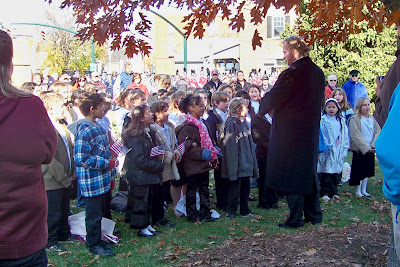 Today is Veterans Day. Our town celebrated with a ceremony at the County Court House. Veterans, their families, and non-veterans, as well as representatives of other community organizations, arrived to participate in the event. Here are some of the scenes:
Today is Veterans Day. Our town celebrated with a ceremony at the County Court House. Veterans, their families, and non-veterans, as well as representatives of other community organizations, arrived to participate in the event. Here are some of the scenes:
 Local school bands played the national anthem and other songs.
Local school bands played the national anthem and other songs. The Commander of the local American Legion Post welcomed visitors.
The Commander of the local American Legion Post welcomed visitors. A chorus from a local elementary school sang patriotic songs.
A chorus from a local elementary school sang patriotic songs. It was a moving ceremony on a clear, cold day. For those who may not know how we came to commemorate this occasion, here is a brief history. In 1918, on the eleventh hour of the eleventh day in the eleventh month, an armistice, or temporary cessation of hostilities, between the Allied nations and Germany went into effect , and the world rejoiced and celebrated. After four years of bitter combat, the "war to end all wars" was over. The first “Armistice Day” was celebrated Nov 11, 1919, to commemorate the end of war.
It was a moving ceremony on a clear, cold day. For those who may not know how we came to commemorate this occasion, here is a brief history. In 1918, on the eleventh hour of the eleventh day in the eleventh month, an armistice, or temporary cessation of hostilities, between the Allied nations and Germany went into effect , and the world rejoiced and celebrated. After four years of bitter combat, the "war to end all wars" was over. The first “Armistice Day” was celebrated Nov 11, 1919, to commemorate the end of war. In Flanders Fields
In Flanders fields the poppies blow
Between the crosses, row on row,
That mark our place; and in the sky
The larks, still bravely singing, fly.
Scarce heard amid the guns below.
We are the dead. Short days ago
We are the dead. Short days ago
We lived, felt dawn, saw sunset glow,
Loved, and were loved, and now we lie
In Flanders fields.
Take up our quarrel with the foe:
To you from failing hands we throw
The torch; be yours to hold it high.
If ye break faith with us who die
We shall not sleep, though poppies grow
In Flanders fields.

The poem above was written by World War I Colonel John McCrae, a surgeon with Canada 's First Brigade Artillery. It expressed McCrae's grief over the "row on row" of graves of soldiers who had died on Flanders' battlefields, located in a region of western Belgium and northern France. The poem presented a striking image of the bright red flowers blooming among the rows of white crosses. Col McCrae died of pneumonia and meningitis in 1918 when he was still working in a field hospital. He was 45 years old. Because of this poem, the poppy came to the flower of remembrance for veterans.
The dream of an end to war would not be realized. Only twenty-odd years after the Armistice, World War II would require the greatest mobilization of soldiers, sailors, Marines and airmen in the Nation’s history. In 1954, Congress changed the name of the event from Armistice Day to Veterans Day, to honor all of America's veterans for their patriotism, love of country, and willingness to serve and sacrifice for the common good.
If you value your freedom, thank a veteran.
Joanie
(Information above adapted from websites of the US Veterans Administration and of Flanders Museum, Belgium)




 This is the view from our family room window, looking out on the deck and the leaves of our two red maples (
This is the view from our family room window, looking out on the deck and the leaves of our two red maples (










